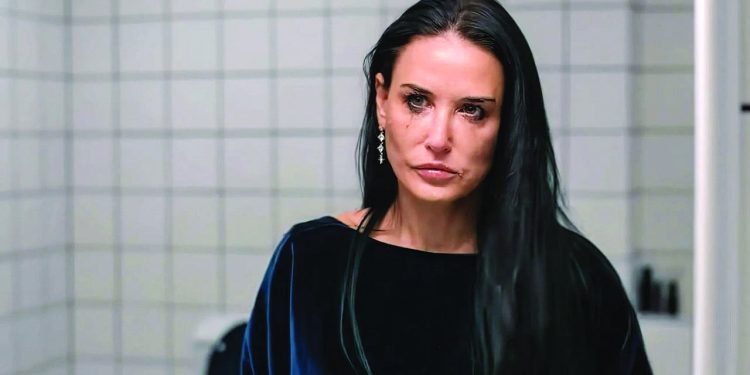‘The Substance’ continues the return of hag
In one of its most hard-hitting scenes, Greta Gerwig’s Lady Bird (Saoirse Ronan), armed with her adolescent defiance, meets her mother Marion’s (Laurie Metcalf) relentless pragmatism. “I want you to be the very best version of yourself,” Marion says, her voice equal parts encouragement and indictment. Lady Bird fires back with a touch of fear and resignation: “What if this is the best version?”
7 years after Gerwig made Lady Bird, French director Coralie Fargeat comes with The Substance, a film that spins a desire for the best into a cynical body horror and brings the year’s most subversive metaphor for motherhood.
It feels almost absurd to juxtapose the warm awkwardness of Lady Bird’s mother-daughter exchanges with the gruesome, unflinching horror of The Substance. Gerwig’s film crafts a Sacramento steeped in nostalgia and growing pains to play as backdrop to this coming-of-age story. It is aliveits thrift stores, tree-lined streets, and Catholic school halls imbued with a sense of place so rich it’s almost tactile. While Lady Bird’s coming-of-age arc finds solace in the tender affirmations of its genre, what narrative remains for women perched at the precipice of cultural invisibility?
Enter Fargeat, whose inspired body horror refurbishes the hagsploitation subgenrea realm of thrillers and horrors built around older women cast as unhinged or dangerous. Demi Moore stars as Elisabeth Sparkle, a former ’80s megastar now relegated to hosting Sparkle Your Life, a cheery morning fitness show. But Elisabeth’s carefully curated world starts to unravel when she learns her producer (Dennis Quaid)a grotesquely crude caricature who happens to be named Harveyfinds her too old at 50. Overhearing his booming directive to an assistant”I want her young, I want her hot, and I want her now!”Elisabeth finds herself staring down the barrel of irrelevance, and the fallout is anything but predictable.
‘A better version’
Fargeat pulls no punches in crafting a feminist statement that cuts straight to Hollywood’s deepest insecurities. There’s a biting meta-commentary woven into the film’s premise about an aging former A-lister in Hollywood whose merit and self-worth are defined by a handpicked crop of balding, wrinkled, white men well over fifty, comically displaying Hollywood’s shortcomings in diversity. And Fargeat is certainly a lot less ambitious in her expectations of women and the human strive for vanity.
Unlike Marion’s lofty and universal “best,” Elisabeth is seduced by a more achievable, tangible “better.” And this is what The Substance, an unabashedly shady black-market drug, procured in a deserted alley free of cost, promises. After a minor car accident leaves her shaken and teary-eyed, a young, strikingly blue-eyed nurse quietly slips a USB flash drive into her pocket. “Have you ever dreamt of a better version of yourself?” A short film introduces the drug when Elisabeth plugs in the drive.
The drug comes with a strict regimena set of instructions, tools, and warnings. “Remember, there is no she and you. You are one.” And then, in a queasy noise-packed, blood-soaked scene, Elisabeth’s “better version” is borna new person, expelled violently from her spine. Enter Sue (Margaret Qualley).
Elisabeth’s Los Angeles unfolds like a surreal fever dream, drenched in a hazy orange glow, the mellow sun casting an almost ineffective warmth on the city’s iconic palm trees. The world she navigates is both familiar and foreignher signature yellow coat cuts a lonely figure in desolate streets, where the pedestrians seem to vanish as quickly as they appear. The hospital, towering and ominous, feels less like a place of healing and more like a monolith of judgement. This LA doesn’t just existit breathes, conspires, and taunts, a hyper-stylised simulation designed to challenge Elisabeth at every turn, even as it pretends to exist solely for her.
The resentful mother
Anyone who has seen real women, of all shapes, sizes, and ages, rather than the polished, pixellated ideals peddled online will marvel at Moore’s formregardless of her age. Not only does she look fit (the proclaimed goal of her fitness show), she looks beautiful, full stop. In the scenes where she teaches aerobics, the camera stays frontal, careful not to sexualise or scrutinise a nook or cranny. But she is no Sue. The cameras know it. She knows it.
Sue is tall, lean, and curvya stark contrast to Elisabeth’s more seasoned formand when she steps into Harvey’s world, she takes Elisabeth’s place. But the film subverts any sense of victory. Sue may have retained Elisabeth’s job, but the cost is high: every seven days they must ‘switch’, making their connection disturbingly intimate and alien. “My mother is very sick and needs care,” Sue tells Harvey, explaining why she must alternate weeks.
She is not wrong. Sue is Elisabeth’s child, a creation of her flesh, a better version of herself. Sue is all Elisabeth has since she has no partner, no marriage, no career or even a future. Sue, while technically Elisabeth herself, is a brat, conniving, seductive. She parties late. She dresses pink and feminine and carries an innocence that could only bewitch men like Harvey. In a sense, The Substance is a coming-of-age story. Except it’s one that kills the sacrificing mother. Elisabeth, unlike the Marions of Lady Bird-like cosy, digestibly tough films, refuses to accept Sue taking what she once dreamed for herself. Even if she has already lived her due.
The male gaze
Fargeat’s directorial approach, brimming with political subtext, can sometimes leave audiences perplexed in its indulgence. While Sparkle Your Life offers a cold, detached critique of media culture, The Substance takes a sharp turn into the overtly sexualised with Sue’s new show, Pump It Up. The camera, now eager to feast on her body, follows her every movezooming in on her bouncing derrière and flat stomach with such intensity that the exercises themselves blur into insignificance.










 American Dollar Exchange Rate
American Dollar Exchange Rate